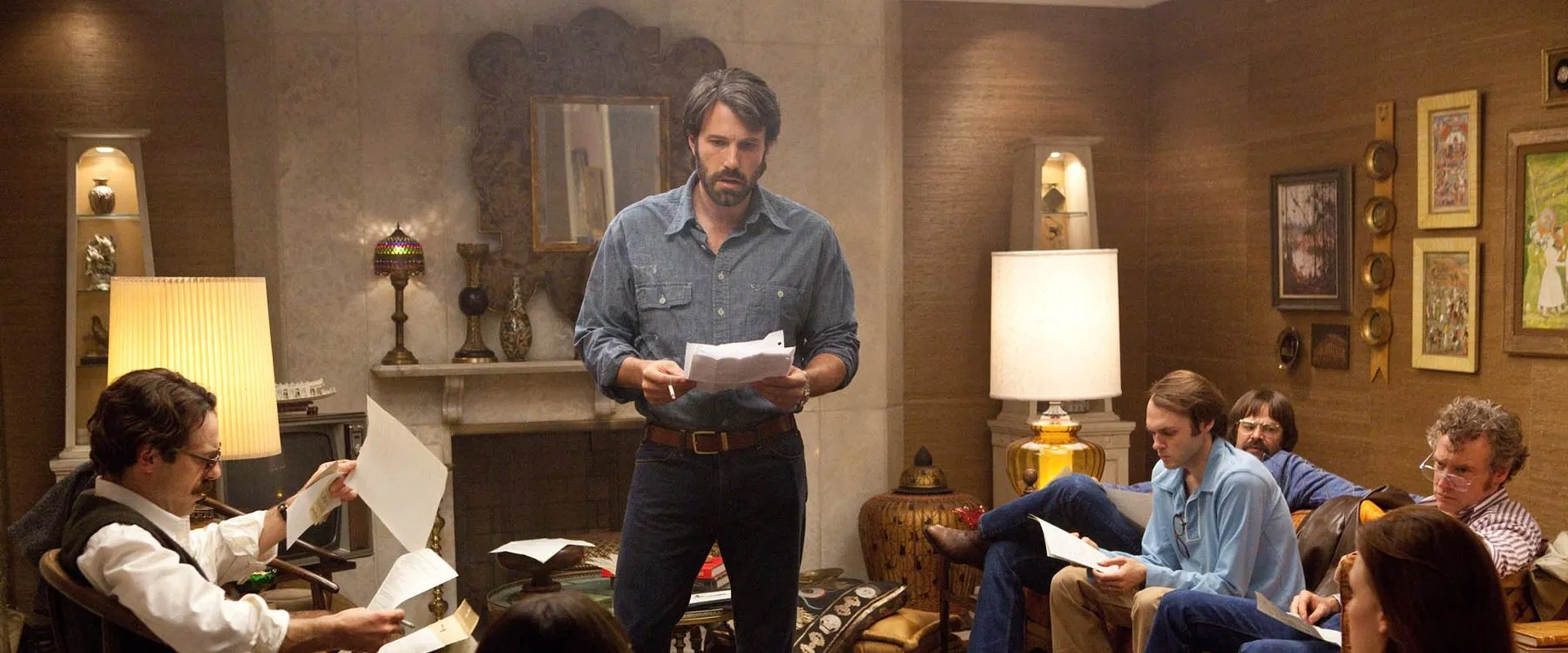Argo isn’t merely a tense, glossy recounting of a CIA caper, it’s Hollywood’s sneakiest sleight-of-hand on itself, a canny distillation of the movies' perpetual promise and perennial absurdity. I went into Affleck’s film without foreknowledge, as untutored as the embassy staffers in their makeshift hideout, and the result was a giddy, queasy experience, poised on a knife-edge between farce and terror. “Based on a true story,” it insists, an audacious phrase in this context, considering what follows.
Ben Affleck, lumbering and taciturn as Tony Mendez, cuts a curious figure at the film’s heart: a man built for blending in, which is to say, a blandness so earnest it almost circles back to mysterious. There's almost a method, or perhaps inadvertent charm, to how uninhabited he makes Mendez, was the real-world operative a cipher, a ghost in a field of subterfuge? Or does Affleck’s handsome opacity simply reflect the movie’s own ice-cool intentions? You keep wondering if what you’re not seeing is the point.
But what a show around him. Alan Arkin, rakish as a crusty producer, and John Goodman, a bearlike Hollywood prosthetic magician, together bolt the film’s most outlandish conceit to a kind of delightful, Borscht Belt reality (“Argo fuck yourself,” is a line with as much bite as mission file). It’s almost as if Affleck recognizes that if you’re going to invite Hollywood into a CIA plot, you might as well let it steal the movie.
The film dances on the line between documentary and mythmaking, cueing up palpable, stomach-twisting tension, never more so than in those final, excruciating 40 minutes, when even the most jaded viewer might feel their vertebrae fuse from clenching. The last act is executed with such brute efficiency and frantic showmanship, cars chasing jetliners with all the literalism of a three-ring circus, that one must squint to remember this is history, albeit lacquered in a Hollywood sheen thick enough to stroke.
Yet that is Argo’s merry duplicity, you sit there, skeptically parsing what’s real and what’s artifact, and realize it probably won’t matter. If even 50 percent of this happened as depicted, it remains a story so insane you half-expect the credits to roll back and reveal it was all a dream cooked up by scriptwriters on an especially strong bender.
Affleck’s craft, though, is clear. The pacing is unyielding, scene after scene not so much passing as cascading, mapped with razor precision by Chris Terrio’s script and judicious editing. Alexandre Desplat’s score thrums and jitters, always a heartbeat away from a panic attack. The most astonishing feat may be the seamless tension in the airport escape, an ostentatiously Hollywood sequence that still manages to make your chair seem both too stable and far too precarious.
For a film rooted in one of America’s great international embarrassments, Argo opens with a rare gesture, backtracking into recent Iranian history, narrated in storyboards, as if insisting we remember that even thrillers have consequences. It’s a moment with the subtlety of hindsight, easily missed but lingering with the faint aftertaste (regret? Understanding?).
And the acting, as ensemble thrillers go, this is as crisp and erudite a collection as you could want. If Affleck’s Mendez is a little too blank, a little too schematic, perhaps that is in keeping with the task, after all, in stories like these, it’s the supporting actors, the civilians, who furnish the chaos and the color.
Does Argo take liberties? Certainly, there’s no need for the cartoonish car chase down the tarmac, no matter how much your lower body responds with instinctive terror. Hollywood can’t help gilding the lily, especially when it’s its own reflection in the mirror. But the movie never apologizes for the exaggeration. To be fair, who would ever have believed the truth?
In the end, Argo isn’t just a rescue mission; it’s a rescue of old-fashioned moviemaking, cloaking anxiety in the sheep’s clothing of entertainment. Walk in blind, and you may emerge, as I did, breathless, wondering how any of this, real or not, could be possible. If only every true story had this much shimmer on its surface, and this much nervous sweat on your palms.


